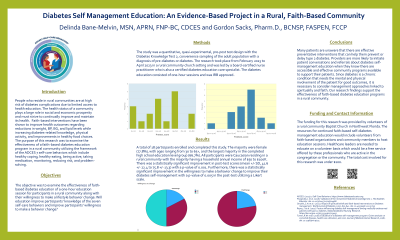Back


Equitable Care for Diverse Individuals and Populations
(P220) Diabetes Self-Management Education: An Evidence-Based Project, in a Rural, Faith-Based Community
Saturday, August 5, 2023
11:00 AM – 1:00 PM CT

Has Audio

Delinda Bane-Melvin, MSN, APRN, FNP-BC, CDCES
Director, Medical Science Liaisons, U.S. Medical Affairs
Fresenius Kabi USA
Altha, Florida, United States
Primary Presenter(s)
Faith-based interventions have been shown to improve health outcomes regarding reductions in weight, blood pressure, blood glucose, and lipid levels and have shown increases in disease-related knowledge, physical activity, and improvements in food choices. Community leaders, health care providers, pastors, and church clergy can play an essential role in supporting both implementation and outcomes of church-based health programs for people with diabetes and pre-diabetes. Studies have shown that spirituality and faith-based interventions are viable management strategies for diabetes especially in the rural communities where access to diabetes education and often healthcare is essentially non-existent. People who reside in rural communities are at high risk of diabetes complications due to limited access to health education. The health status of a community plays a large role in social and economic prosperity and must strive to continually improve and maintain its health. This poster reviews research to examine the effectiveness of a faith-based diabetes education program in a rural community in Alabama.
